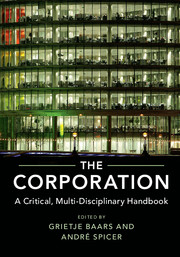Book contents
- Frontmatter
- Contents
- List of Contributors
- Acknowledgements
- Introduction: Why the Corporation?
- PART I DISCIPLINARY OVERVIEWS
- PART II INTERDISCIPLINARY THEMATIC CHAPTERS
- 1 The Evolution of the Corporate Form
- 2 The Multinational Corporate Group
- 3 The Financialization of the Corporation
- 4 Corporate Value Chains
- 5 Corporate Citizenship
- 6 The Corporation and Crime
- a The Criminal Corporate Person
- b The FBI on Corporate Crime: Examining the Influence of Corporate Culture
- c Mental Blockades in the Recognition of Mens Rea in Corporations
- 7 The Corporation and Ideology
- 8 Corporation and Communities
- 9 Corporations and Resistance
- 10 Alternatives to the Corporation
- Index
- References
a - The Criminal Corporate Person
from 6 - The Corporation and Crime
Published online by Cambridge University Press: 31 March 2017
- Frontmatter
- Contents
- List of Contributors
- Acknowledgements
- Introduction: Why the Corporation?
- PART I DISCIPLINARY OVERVIEWS
- PART II INTERDISCIPLINARY THEMATIC CHAPTERS
- 1 The Evolution of the Corporate Form
- 2 The Multinational Corporate Group
- 3 The Financialization of the Corporation
- 4 Corporate Value Chains
- 5 Corporate Citizenship
- 6 The Corporation and Crime
- a The Criminal Corporate Person
- b The FBI on Corporate Crime: Examining the Influence of Corporate Culture
- c Mental Blockades in the Recognition of Mens Rea in Corporations
- 7 The Corporation and Ideology
- 8 Corporation and Communities
- 9 Corporations and Resistance
- 10 Alternatives to the Corporation
- Index
- References
Summary
Introduction
All first-year criminology students learn that the most deadly criminals are not individuals but private corporations. Moreover, they learn that when corporations steal and kill, they generally get away with it, not as a matter of conspiracy, but as a matter of policy. Those assertions are no longer controversial in the academic study of crime and criminal justice. The conclusion that the social and economic costs of corporate and white-collar crime have more extensive and profoundly damaging effects that any other type of crime is a consistent finding in the academic research (e.g., Pearce, 1976; Snider, 1993; Friedrichs, 2009; Croall, 2011).
Yet corporations and their senior executives are rarely regarded as ‘usual suspects’ by criminal justice agencies, politicians or mainstream media outlets. The bulk of social harms that are produced by corporations, even if they are theoretically punishable in law are rarely, in practice, criminalized. The term ‘regulation’ – which applies to the forms of criminal law that apply to corporate activities – indicates that those phenomena are not defined in law or policed with anything like the same level of intensity that interpersonal crimes are. Thus corporate crimes are dealt with not by the police but by separate enforcement authorities or regulatory agencies; if they are subjected to law enforcement, they tend to be dealt with in spheres of law that resemble, but are not quite the same as, criminal law, processed using administrative or informal disposals rather than prosecution; and even if they are subject to formal processes of criminal law – as they intermittently are – corporate crimes are rarely viewed in political or public discussion as ‘real’ crimes.
The primary focus of the criminal law and the criminal justice system is the real, human individual that makes real, rational choices and must be held responsible for those choices. Corporations cannot be imagined in this way because they are not real, human individuals and therefore cannot be held criminally responsible for their actions in quite the same ways that individuals can. Under some conditions, corporations can be criminalized, yet they generally – for reasons that will be explored in this chapter – are not.
- Type
- Chapter
- Information
- The CorporationA Critical, Multi-Disciplinary Handbook, pp. 384 - 391Publisher: Cambridge University PressPrint publication year: 2017



